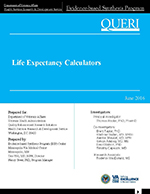
Principal Investigator:
Thomas Rector, PhD, PharmD
Co-investigators:
Brent Taylor, PhD
Shahnaz Sultan, MD, MHSc
Aasma Shaukat, MD, MPH
Selcuk Adabag, MD, MS
David Nelson, PhD
Timothy Capecchi, MD
Research Associate:
Roderick MacDonald, MS
Download PDF: Complete Report, Executive Summary, Report, Appendices
Estimation of life expectancy serves an important role in clinical decisions about screening for disease and treatment in primary care practices. Increasingly, clinical guidelines recommend a course of action in context of the patient's life expectancy. While many tools have been developed to estimate life expectancy or the likelihood of surviving for a period of time, there are no well-established decision support tools that are broadly applicable to primary care.
For a life expectancy calculator to gain widespread use in primary care, it needs to have acceptable and validated predictive accuracy at decision-relevant times such as 6 months or 5 years, proven usefulness, and be readily available. In 2012, a systematic review by Yourman et al summarized existing life expectancy calculators that may be useful for older patients in primary care. However, none of the reviewed calculators met our criteria for widespread use. The purpose of this systematic review was to update the search on life expectancy calculators, with focus on calculators that may be valuable for use in the Veterans Health Administration population receiving primary care.
With input from Operational Partners and Technical Expert Panel members, we developed the following Key Questions for the review:
Key Question 1: Between 2011 and 2016, have there been any additional reports of life expectancy calculators that may have sufficient predictive accuracy for use in adult primary care practice?
Key Question 2: Of the life expectancy calculators being reviewed have any external validation studies been published between 2011 and 2016? If yes, what population was studied and what was the predictive accuracy therein?
Key Question 3: What is the clinical use of the mortality prediction models (aka life expectancy calculators), and was there improvement in patient survival times, health-related quality of life, provider-patient communication, patient satisfaction and participation in clinical decisions, or lower healthcare utilization and costs?
Life Expectancy Calculators (Management Brief)